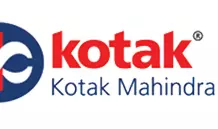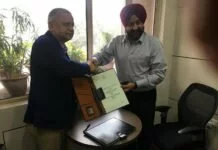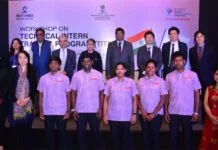What prompted you to come up with concept like Mavyn? Tell us a bit about you journey.
My roots are deeply grounded in the logistics business as I belong to a family who has invested a lifetime in the transportation business. I was fortunate that my father kept investing in infrastructure and technology. His ideology inspired me to achieve my dreams. I have first hand witnessed the transformation that the trucking business has undergone in India and seen the emergence of a more organised supply chain business. However unlike other businesses a large number of entrepreneurs and young professionals are not interested in supply chain & logistics. Through my personal experience of working in this sector and research I realised the pivotal role that technology can play in the logistics sector. All major companies in this space are investing in information technology.
Apart from my keen interest in this space and the advent of technology in the logistics sector I realised that there was a new trend coming up in the Indian start-up ecosystem. In 2010-2011 companies like Uber and Ola were gaining market share. Inspite of making huge losses these companies were getting better valuations. One thing which I realised from these companies is that giving app to drivers is possible and providing hardware is no more a concern. These two companies have changed the dynamics of the taxi industry from an operator model to an aggregator model.
I thus realised that an aggregator model could also work for the trucking business in India based on the following two aspects-
- Availability of Smartphones – the connectivity with the world at your fingertips.
- Availability and accessibility (24×7 at your door step) – any company which brings service to customers 24×7 and at their door step will be a successful.
Keeping the above two thoughts I started working on my vision for Mavyn. I started working on a long haul model. During 2014 there were many long haul startups but all were providing the bid and match business model which was running in USA and everyone was replicating the same in India. But India is a very different market and unorganised. I wanted to build a company which was more relevant to the Indian trucking dynamics and had a model that was both scalable & profitable. This idea gave birth to ‘Mavyn’ – Digital Trucking Company. In 2014-15, I formed an IT team and started building the software. It took me over 3 years to design, develop and customise the software as per the requirements of the Indian trucking industry. In 2017 August, I started building the marketing team and in November 2017 we started the trial run for Mavyn.
What is the unique service proposition of Mavyn?
Mavyn’s innovative trucking concept aims to benefit all the four stakeholders – Shippers, Truckers, Drivers and Partners in the associated ecosystem. While latest inroads in digital trucking have helped the logistics sector to become more cost competitive, the problem of high operational cost is still a hindrance. The highlight and USP of Mavyn’s model is that it provides the lowest freight rates of the day with lowest operational cost in the industry. The Mavyn model is based on a B2B and Asset Light model. It acts as a bridge between the shipper and the trucker – thus encouraging transparency in the business by passing the freight secured from shipper to trucker after deducting app charges. It does not engage in labour activities as loading and unloading are done by consignor or consignee. The business model doesn’t require any warehousing.
Some of the key USPs of this model are –
• Guaranteed lowest freight rates for the day
- Guaranteed booking and availability within 6 hours
- 24×7 availability and accessibility
- Digital trucking – paperless & cashless.
What is the kind of revenue/business you have achieved since inception?
Mavyn started in November 2017 during this period we tested the application and approached shippers and truckers for using our platform. Mavyn started commercial operations in April 2018. We started with 24 shipments and about 194 vehicles in April 2018. Today we are doing more than 200 shipments a month and have more than 2500 active vehicles on our platform. The number of shippers has also grown from 5 in April 2018 to 20 in December 2018. Monthly revenues have also grown from INR 1.2 million in April 2018 to INR 12 million in December 2018.
What have been the initial investments you have made in Mavyn and what are the business projections for the next two years?
Mavyn is backed by the Chetak Group but still I borrowed money from my father. I wanted to really start the business as a startup. I took a small space within the Chetak Head office. This space is totally separate so that culture of a startup could be maintained. As and when fund requirements are there for growth, expansion or acquiring shippers, I take loans from my father. We started with INR 10 million initial seed capital for development of software and website. Then another INR 20 million was invested by the Chetak Group for further testing and trial run of the model. The next INR 25 million was taken to meet the current working capital and expansion requirement.
We have a clear vision to build a digital logistics space. Offering all logistics services on touch of a smartphone. Our plans for 2019 are to lift 100 shipments per day and 20,000 vehicles on our platform. By 2020, we will lift 400 shipments per day and have 200000 commercial vehicles on our platform.
What challenges are you facing in an industry like logistics & trucking and what are the specific challenges of being a startup?
The major challenge for Mavyn was to convert the challenges of Logistics sector into opportunities for growth. Few industry challenges which we have identified are
- Almost 50% underutilisation or Ideal waiting of vehicles.
- Compliance/documentation formalities under GST for small truckers/brokers.
- Getting verified truckers who can provide timely placements and deliveries to shippers.
- Complete and timely payments to truck owners from broker or transport companies.
The first challenge of a startup is to build a team and to convince candidates to believe in the founder and the concept. Moreover during that gestation period a company has to bear all the costs and at the same time we need to keep motivating employees that we will succeed. Another major challenge is to convince prospective customers to give business on new business model without any work experience and references; this requires a lot of patience. And most importantly fund management is a continuous challenge. If you are not growing then funds are required to pay for all the fixed costs and if you are growing then the funds are required for expansions, working capital, marketing expenses, etc.
However with Mavyn we have realised that at the end of the day three things are very important in order to succeed and overcome the challenges
- Promoter must be passionate to build business.
- Concept should be profitable and scalable.
- Proof of concept should be conducted thoroughly.
What have been some of the key accomplishments of Mavyn?
We did 27 shipments and acquired 5 shippersin April 2018. And today we are doing 200 shipments with 20 shippers. We have added 1200 truckers and 2500 vehicles on our platform. We started with 2 districts and 12 routes in April 2018 but today we are available in 17 districts across India, providing services on 60 routes and we are continuously expanding. We have some of the leading companies across e-commerce to FMCG to lifestyle that are using our platform for shipments. We work completely paperless and cashless. Our entire journey of transportation from shipment ordering to delivery is manpower less transaction.
What is your outlook for the sector and future plans for your business?
The outlook for the transportation industry by 2025 is very bright. The industry is going through key structural changes and decade old matrixes are phasing out. GST implementation has given confidence to international companies to invest in India. GST has also helped in removing state entry forms and multi layered taxation to give smooth flow of goods. All this has directly brought efficiency in transportation and pushed growth. The penetration of internet and smartphone has pushed the need for logistics on demand. We have already seen this happening in many industries like ecommerce, taxi, food delivery, last mile delivery and others. The Line long haul businesses have not seen much investment for VC’s however we foresee the sector attracting huge investments in the next 2-3 years. The surge of funds will help the sector to unleash its true potential.
My vision is to build a digital logistics industry parallel to the physical industry in India. All logistics services will be available on the Mavyn App. We also plan to start operations in markets outside India which have potential for our business model in the coming years. We aim to have 20% of all commercial vehicles on Mavyn platform in the next 4 years.

















